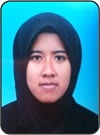Recognize Teachers’ Perception of the School-Based Assessment (SBA) Effectiveness in Increasing Students’ Achievement in Mathematics
Abstract
ABSTRACT: In the assessment of Mathematics, the policy makers have noticed that many students were quite able to learn the necessary formula and apply them to the limited range of textbook and test situation; but when faced with novel problem, they fell short and showed that they were far from having understood the relevant concepts and conceptual relations. Therefore, an effective assessment is needed to promote students’ mastery of Mathematical thinking through SBA (School-Based Assessment). SBA is a formative assessment which provide the students’ progress from one level to another level. Teachers can create a diagnostic measure to detect the students’ progress from time to time. This provides an opportunity for teachers to correct any mistakes and improve students’ weaknesses immediately, so that these weaknesses are not accumulated. This study sought to recognize the teachers’ perception of the SBA effectiveness in increasing students’ achievement in Mathematics. A total of 50 Mathematics teachers from Secondary Schools in Kedah, Malaysia participated in the survey. A 19-items questionnaire was employed to measure teacher’s perception on the SBA effectiveness and students’ scores in Mathematics. The data were analysed quantitatively using descriptive statistics and logistic regression. The result showed that the teachers’ perception on the SBA effectiveness in school had no statistically significant relationship with the students’ achievement in Mathematics. This finding implied that the teachers’ perception on the effectiveness of SBA practiced in school didn’t affect the students’ achievement in Mathematics.
KEY WORDS: Teachers’ Perception; School-Based Assessment; Mathematics; Effective Assessment; Students’ Achievement.


About the Authors: Farhana Mohamad Radzi completed her Master specialize in Educational Psychology and degree in Mathematics at IIUM (International Islamic University of Malaysia) in Gombak, Kuala Lumpur, Malaysia. Siti Salwa Md Sawari is currently Ph.D. Candidate at the Faculty of Islamic Civilization UTM (Malaysia University of Technology) in Kuala Lumpur, Malaysia. Corresponding authors are: farhana.radzi@gmail.com and salwa.sawari@gmail.com
How to cite this article? Radzi, Farhana Mohamad & Siti Salwa Md Sawari. (2016). “Recognize Teachers’ Perception of the School-Based Assessment (SBA) Effectiveness in Increasing Students’ Achievement in Mathematics” in EDUCARE: International Journal for Educational Studies, Vol.8(2) February, pp.139-146. Bandung, Indonesia: Minda Masagi Press and UMP Purwokerto, ISSN 1979-7877.
Chronicle of the article: Accepted (November 27, 2015); Revised (January 27, 2016); and Published (February 28, 2016).
Keywords
Full Text:
PDFReferences
Article entitled “Effective Grading Practices in the Middle School and High School Environments” in HR: Hanover Research, February 2011, pp.1-37. Available online also at: https://njctl-media.s3.amazonaws.com [accessed in Kuala Lumpur, Malaysia: April 7, 2015].
Babbie, E. (2001). The Practice of Social Research. Belmont, CA: Wadsworth Thomson, 9th edition. Available online also at: http://sociology.about.com/od/Types-of-Samples/a/Purposive-Sample.htm [accessed in Kuala Lumpur, Malaysia: April 7, 2015].
Barley, S.Y. (2013). “Perspectives of School-Based Assessment in the NSS Curriculum through the Eyes of the Administrative and Teaching Stakeholders in Hongkong”. Unpublished Paper.
Black, P.J. & D. Wiliam. (1998). Inside the Black Box: Raising Standards through Classroom Assessment. London: King’s College.
Chan, Y.F. & K.S. Gurnam. (2011). “School-Based Assessment among ESL Teachers in Malaysian Secondary Schools” in Malaysian Education Deans' Council Journal, Vol.9 [December], pp.75-87, ISSN 1511-8959.
Chan, Y.F., K.S. Gurnam & Md Rizal Md Yunus. (2006). The Knowledge and Best Practices of Secondary ESL Teachers in School-Based Assessment. Shah Alam: UiTM [Universiti Teknologi MARA] Press.
Choi, C.C. (1999). “Public Examinations in Hong Kong” in Assessment in Education, 6(3), pp.405-417.
Gan, Z. (2013). “Learning to Teach English Language in the Practicum: What Challenges Do Non-Native ESL Student-Teachers Face” in Australian Journal of Teacher Education, 38(3), pp.92-108.
Gipps, C. (1999). “Socio-Cultural Aspects of Assessment” in Review of Research in Education, 24, pp.355-392.
Glewwe, Paul & Michael Levin. (2000). “Presenting Simple Descriptive Statistics from Household Survey Data: Chapter XVI” in Household Sample Surveys in Developing and Transition Countries. Available online also at: http://unstats.un.org/unsd/Hhsurveys/pdf/Chapter_16.pdf [accessed in Kuala Lumpur, Malaysia: May 2, 2015].
Hailu, Ewnetu & Firdisa Jabesa. (2010). “Teachers’ Perception of School-Based CPD in Jimma Zone Selected Schools” in Ethiopian Journal of Education and Sciences, 6(1). Ethiopia: Official Journal of Jimma University.
Hall, G.E., A.A. George & W.L. Rutherford. (1977). Measuring Stages of Concern about the Innovation: A Manual for the Use of the SoC Questionnaire. Austin: Research and Development Center for Teacher Education, University of Texas.
Hall, G.E. & S.M. Hord. (2011). Implementing Change: Patterns, Principles, and Potholes. New York: Allyn & Bacon Publisher, 3rd edition.
Hassan, Aminuddin & Sim Kuan Yew. (2013). “Successful Implementation of the National Philosophy of Education Pertaining to the Level of Emotional and Spiritual Intelligences in the Educational Environment” in International Journal of Psychology and Behavioral Sciences, 6(3), pp.184-187. Available online also at: file:///C:/Users/acer/Downloads/2013AminSky-%20IntJurPsy&BehavSc.pdf [accessed in Kuala Lumpur, Malaysia: May 2, 2015].
Hwa, T.Y. & C.S. Lim. (2008). “Implementing School-Based Assessment: The Mathematical Thinking Assessment (MATA) Framework”. Bahan Seminar Inovasi Pedagogi IPBL: Implementing School-Based Assessment. The MATA Framework Seminar Inovasi Pedagogi IPBL, on 28 August, pp.73-88.
Lane, S. (1993). “The Conceptual Framework for the Development of a Mathematics Assessment Instrument for QUASAR” in Educational Measurement: Issues and Practice, 12 (2), pp.16-23.
Lange, Jan de. (1999). “Framework for Classroom Assessment in Mathematics”. Available online at: http://www.fi.uu.nl/catch/products/framework/de_lange_frameworkfinal.pdf [accessed in Kuala Lumpur, Malaysia: May 2, 2015].
Larson, Matt. (2002). “Essential Characteristics of Effective Mathematics Instruction”. Available online at: https://www.eduplace.com/state/pdf/author/larson1.pdf [accessed in Kuala Lumpur, Malaysia: May 2, 2015].
Levinsson, M., H. Hallstrom & S. Claesson. (2013). “Problems in Developing Formative Assessment: A Physics Teacher’s Lived Experiences of Putting the Ideas into Practice” in Opublicerat Manus. Goteborg: Goteborgs Universitet.
Majid, Faizah A. (2011). “School-Based Assessment in Malaysian Schools: The Concerns of the English Teachers” in Journal of US-China Education Review, 8(1).
Mansor, Azlin Norhaini et al. (2013). “The Benefits of School-Based Assessment” in Asian Social Science Journal, Vol.9(8), pp.101-106.
Marva, D. (2008). Teacher Perceptions of the Implementation of the National Continuous Assessment Programme in a Primary School in the St. George East Education District in Trinidad and Tobago. USA [United States of America]: School of Education, Faculty of Humanities and Education, The University of the West Indies.
Marzano, R. & T. Michael. (2011). “Examining the Role of Teacher Evaluation in Student Achievement” in Contemporary Research Base for the Marzano Causal Teacher Evaluation Model. Available online also at: http://ok.gov/sde/sites/ok.gov.sde/files/TLE-MarzanoWhitePaper.pdf [accessed in Kuala Lumpur, Malaysia: May 2, 2015].
Md Ali, Ruzlan, Arsaythamby Veloo & Hariharan N. Krishnasamy. (2015). “Implementation of School-Based Assessment: The Experienced Teachers’ Thoughts” in Australian Journal of Basic and Applied Sciences, 9(1), Special Issue, pp.72-78. Available online also at: http://ajbasweb.com/old/ajbas/2015/Special%20MPCN%20Bandung/72-78.pdf [accessed in Kuala Lumpur, Malaysia: May 2, 2015].
MoE [Ministry of Education] Malaysia. (2012). Malaysia Education Blueprint, 2013-2025. Putrajaya: Ministry of Education, Malaysia.
MoE [Ministry of Education] Malaysia. (2014). “School-Based Assessment”. Available online also at: http://www.moe.gov.my/v/soalan-lazim?cat=31 [accessed in Kuala Lumpur, Malaysia: May 2, 2015].
Mutlu, Gizem. (2014). “Challenges in Practicum: Pre-Service and Cooperating Teachers’ Voices” in Journal of Education and Practice, Vol.5(2), pp.1-7. Available online also at: http://www.iiste.org/Journals/index.php/JEP/article/viewfile/17465/17724 [accessed in Kuala Lumpur, Malaysia: May 2, 2015].
Myers, T.A. et al. (2013). “The Relationship between Personal Experience and Belief in the Reality of Global Warming” in Nature Climate Change, 3, pp.343-347. Available online also at: http://www.nature.com/nclimate/journal/v3/n4/full/nclimate1754.html [accessed in Kuala Lumpur, Malaysia: May 2, 2015].
Peng, Chao-Ying Joanne, Kuk Lida Lee & Gary M. Ingersoll. (2002). “An Introduction to Logistic Regression Analysis and Reporting” in The Journal of Educational Research, Vol.96(1), September-October, pp.3-14. Available online also at: https://datajobs.com/data-science-repo/Logistic-Regression-[Peng-et-al].pdf [accessed in Kuala Lumpur, Malaysia: May 2, 2015].
Raman, Kumutha & Hamidah Yamat. (2014). “English Teachers’ Voices on the Challenges of the School-Based Assessment” in Frontiers of Language and Teaching, 5, pp.66-73.
Ronald, H.H. (2009). “Teacher Effectiveness and Student Achievement: Investigating a Multilevel Cross-Classified Model” in Journal of Educational Administration, 47(2), pp.227-249. Available online also at: http://www.emeraldinsight.com/journals.htm?articleid=1779077 [accessed in Kuala Lumpur, Malaysia: May 4, 2015].
Salmiah, J. (2013). “Acceptance towards School-Based Assessment among Agricultural Integrated Living Skills Teachers: Challenges in Implementing a Holistic Assessment” in Journal of Technical Education and Training, 5.
Sui-Chu, H.O. Esther. (2012). “Student Learning Assessment” in Asia-Pacific Education System Review, 5.
Talib, Rohaya et al. (2014). “From Principle to Practice: Assessment for Learning in Malaysian School-Based Assessment Classroom” in International Journal of Social Sciences & Education, Vol.4(4), pp.850-857. Available online also at: http://ijsse.com/sites/default/files/issues/2014/v4-i4-2014-1/Paper-11.pdf [accessed in Kuala Lumpur, Malaysia: May 2, 2015].
Tan, A.M. (2010). SBA di Malaysia: Kesediaan Guru, Isu, dan Panduan Perlaksanaan. Kuala Lumpur: Gerak Budaya Enterprise.
EDUCARE: International Journal for Educational Studies. Ciptaan disebarluaskan di bawah Lisensi Creative Commons Atribusi-BerbagiSerupa 4.0 Internasional
